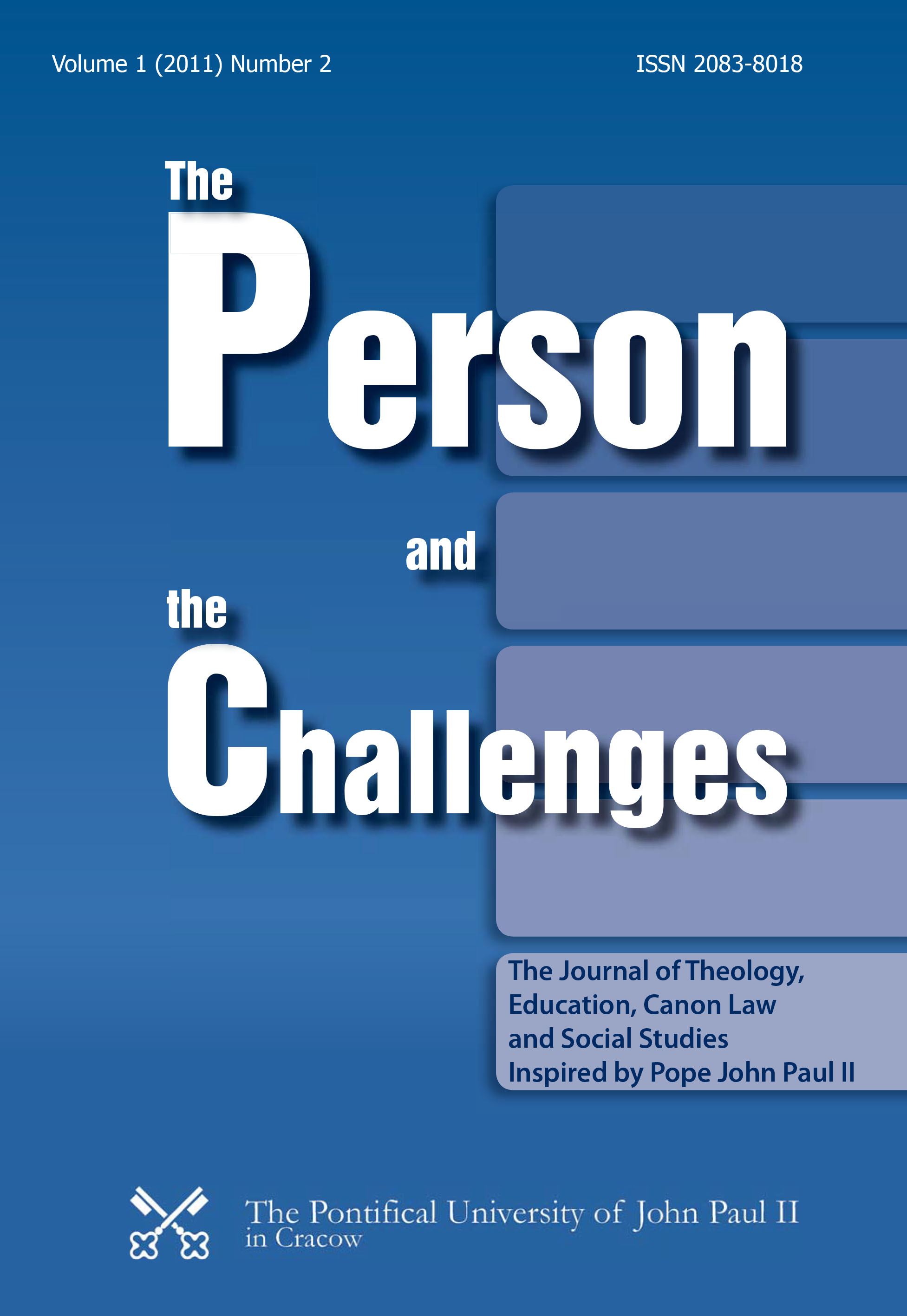Erwartungen an die katholische Schule in einem postmodernen Zeitalter
DOI:
https://doi.org/10.15633/pch.854Słowa kluczowe:
Catholic school, education, parents, Church, governmental institutionsAbstrakt
Catholic schools are the subject of many expectations. Yet, the most important sets of expectations are three: parents, the Church and governmental institutions. Parents do not know any more what would be the best preparation for the future of their children, but they expect that Catholic school should prepare their children for their future jobs in the best possible way. The Church concentrates mostly on the religious role of Catholic schools and the governmental education authorities and institutions devote their attention to right attitudes in the civil society. Being a subject of so many, varied expectations, the Catholic school needs to respond constructively to these expectations and show a commitment to the integral and holistic education of every pupil in the postmodern and consumer society.
Bibliografia
Catholic Bishops’ Conference of England and Wales, A Struggle for Excellence: Catholic Secondary Schools in Urban Priority Areas, London 1997.
Catholic Bishops’ Conference of England and Wales, Catholic Schools and Other Faiths, London 1997.
Catholic Bishops’ Conference of England and Wales, Foundations for Excellence: Catholic Primary Schools in Urban Poverty Areas, London 1999.
Catholic Bishops’ Conference of England and Wales, The Common Good and the Catholic Church’s Social Teaching, London 1996.
Catholic Bishops’ Conference of England and Wales, The Common Good in Education, London 1997.
Catholic Education Service, Quality of Education in Catholic Secondary Schools, London 1995.
Catholic Education Service, Spiritual and Moral Development Across the Curriculum, London 1995.
Catholic Education Service, The Inspection of Catholic Schools, London 1994.
Callaghan J., Cockett M. (Hrsg.), Are our Schools Christian?, Great Wakering 1975.
Chesters A., Distinctive or Divisive? The Role of Church Schools, Hertford 2001. Durka G., Smith J. (Hrsg.), Emerging Issues in Religious Education, New York 1976.
Eaton M., Longmore J., Naylor A., Cassel C. (Hrsg.), Commitment to Diversity.
Catholics and Education in a Changing World, London - New York 2000.
Erricker C., Erricker J., Reconstructing Religious, Spiritual and Moral Education, London 2000.
Fahy P., Faith in Catholic Classrooms, Homebush 1992.
Gallagher J., Our Schools and our Faith. A Pastoral Concern and Challenge, London 1988.
Gatt S., Lombaerts H., Osewska E., Scerri A., Catholic Education, European and Maltese Perspectives. Church School’s Response to Future Challenges, Floriana 2004.
Grace G., Catholic Schools and the Common Good: what this Means in Educational Practice, London 2000.
Grace G., Catholic Schools: Mission, Markets and Morality, London 2002. Hayes M., Gearon L. (Hrsg.), Contemporary Catholic Education, Leominster 2002.
Hayes M., Gearon L. (Hrsg.), Contemporary Catholic Schools, Leominster 2002.
Kawula S. (Hrsg.), Pedagogika rodziny: obszary i panorama problematyki, Wydawnictwo Adam Marszałek, Toruń 2006.
Keane R., Riley D. (Hrsg.), Quality Catholic Schools, Brisbane 1997. Lombaerts H., Lasalllian Education Grapping with the European Union, Roma 2007.
Lombaerts H., The Management and Leadership of Christian Schools, Groot Bijgaarden 1998.
McLaughlin T., Parental Rights in Religious Upbringing and Religious Education Within a Liberal Perspective, mps, University of London 1990.
McLaughlin T.H., O’Keefe J., O’Keeffe B. (Hrsg.), The Contemporary Catholic School: Context, Identity and Diversity, London 1996.
McMahon J., Neidhart H., Chapman J. (Hrsg.), Leading the Catholic School, Richmond 1997.
Opozda D. (Hrsg.), Rodzicielstwo – wybrane zagadnienia kontekstów edukacyjnych, Lublin 2007, Verlag KUL.
Osewska E., Edukacja religijna w szkole katolickiej w Anglii i Walii w świetle „Living and Sharing Our Faith. ANational Project of Catechesis and Religious Education”, Tarnów 2008, Verlag Biblos.
Osewska E., Stala J., Catholic School. Polish Perspective, “Rivista lasalliana” 75 (2008) Nr 2, S. 241-246.
Pachociński R., Współczesne systemy edukacyjne, Warszawa 2000. Purnell P., Our Faith Story, London 1985.
Rossiter G. M., Catholic Education and Values: A Review of the Role of Catholic Schools in Promoting the Spiritual and Moral Development of Pupils, “REA: A Journal of Religion, Education and the Arts” (2003) Nr 4, S. 105-136.
Stala J., Lehrpläne und Schulbücher für den Religionsunterricht an den Staatlichen Grundschülen in Polen, „Bogoslovni vestnik“ 70 (2010) Nr 3, S. 405-414.
Stannard O., A Catholic Response to the Current Church Schools Debate, London 2002.
Stannard O., Statement from CES on the Expansion of Faith Schools, London 2001.
Sullivan J., Catholic Education: Distinctive and Inclusive, Dordrecht 2000. Sullivan J., Catholic Schools in Contention: Competing Metaphors and Leadership Implications, Dublin 2000.
Waddington R. M., A Future in Partnership, London 1984.
Pobrania
Opublikowane
Numer
Dział
Licencja
Prawa autorskie (c) 2015 Elżbieta Osewska

Utwór dostępny jest na licencji Creative Commons Uznanie autorstwa 4.0 Międzynarodowe.
Autorzy publikujący w czasopiśmie udzielają jego wydawcy zgody o następującej treści:
- Autor zachowuje autorskie prawa majątkowe do utworu, a jednocześnie udziela wydawcy czasopisma zgody na jego pierwszą publikację w wersji drukowanej i wersji online na licencji Creative Commons Uznanie autorstwa 4.0 Międzynarodowe oraz zgody na wykonywanie opracowań, w tym przekładów.
- Autor ma możliwość udzielania zgody niewyłącznej na opublikowanie utworu w wersji, która ukazała się w czasopiśmie (np. zamieszczenia go w repozytorium instytucjonalnym lub opublikowania w książce), wraz z informacją o jego pierwszej publikacji w czasopiśmie.
- Autor może umieścić swój utwór online (np. w repozytorium instytucjonalnym lub na swojej stronie internetowej) jeszcze przed zgłoszeniem utworu do czasopisma.

